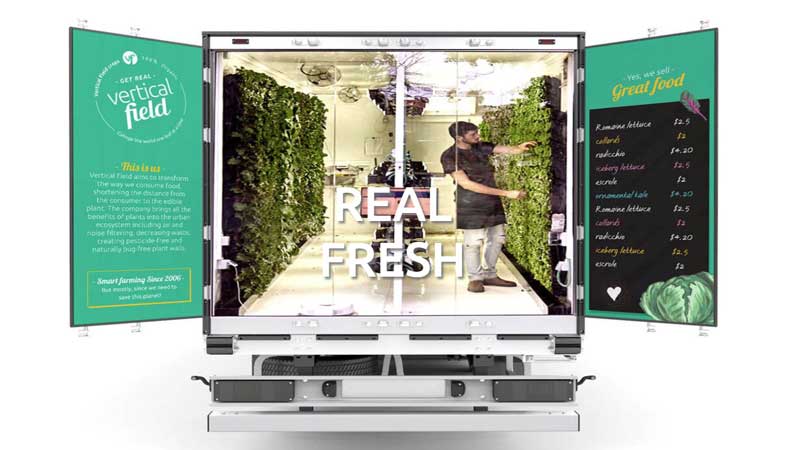Vertical Farms to Install in the United Emirates and Ukraine
Tuesday, 26 January 2021 04:19.PM
- Vertical Field Signs Pilot Agreement to Install Vertical Farms in the United Emirates.
- The agreement with Emirates Smart Solutions & Technologies (ESST) is expected to expand to a large-scale multi-million dollar partnership. -
Vertical Field an Israeli ag-tech company specializing in vertical farming, has signed an agreement with Emirates Smart Solutions & Technologies (ESST) a company that develops innovative agricultural projects in the Persian Gulf, to deploy pilot vertical farms as a first stage to full-scale deployments in the United Arab Emirates.
Vertical Field has developed and commercialized unique soil-based vertical farms in containers that produce locally sourced vegetables. These indoor farms are capable of growing a variety of fresh greens and other vegetables through the company's proprietary technology. Vertical Field's farms therefore offer a unique on-site service for local supermarkets, restaurants, outdoor markets and distribution centers.
Vertical Field develops vertical agricultural farms that enable crops to grow in the city. Vertical Field's unique technology enables produce to grow on a bed of soil (geoponically) inside of repurposed shipping containers. Vertical Field's advanced technologies enable high-quality crops to grow quickly and efficiently in optimum conditions without the use of chemical fertilizers or pesticides. These customizable urban farms can grow a range of fresh crops for supermarkets, restaurants, urban farmer's markets, and distribution centers. Vertical Field's technology is more efficient and less wasteful than conventional agricultural methods, using 90% less water, and growing precise quantities of produce in a controlled environment.
Produce inside Vertical Field's containers can therefore grow 365 days a year, are not limited to seasonality constraints, weather conditions, extreme climate events, or geographic location. The farms are modular, expandable, and moveable, and can be managed automatically. Produce is grown in a sterile container with minimal human interference. Crops that are currently grown in the farm include: several varieties of lettuce, basil, parsley, kale, mint, and more, which are sold at competitive prices.
Within the framework of the UAE agreement, Vertical Field will conduct a pilot project that will ascertain the most suitable crops for the local market. The project will be conducted with the professional support and oversight of the Company's Israeli agronomists. The vertical farm is designed to provide local and on-site produce that is free of chemical pesticides and fertilizers for both commercial establishments as well as the private sector. The first stage of the project will be launched in the United Arab Emirates, and is expected to expand into a multimillion dollar partnership that will include deployments in additional states of the Gulf region.
The first farm will be installed in Umm Al Quwain as part of a research, development, and training center, which is expected to support additional projects in the rest of the Gulf states.
On January 6, 2021 Vertical Field has signed an agreement with Moderntrendo S.R.O, one of the largest agricultural distributors in Ukraine, for a promotion of nationwide deployments of vertical farms. Vertical Field will conduct an initial pilot at Varus, one of the biggest national supermarket chains in the country, in early 2021 before expanding to other chains. Varus operates 95 stores across 25 cities and attracts approximately 260,000 customers daily.
Vertical Field customers benefit from advanced farming that produces pesticide-free and exceptionally fresh vegetables. Vertical Field's technology is more efficient and generates less waste than conventional agriculture, utilizing 90% less water, while growing precise quantities in a controlled environment, and achieving shorter growing cycles. The Company offers 365 days a year 'in season' produce regardless of geography, physical location, weather and climate conditions, with consistently high product quality. The farms are modular, expandable, and moveable, with fully automated crop management, and a sterile environment that requires significantly less human contact. The crops that are currently offered include: lettuce, basil, parsley, kale, mint and others, sold at highly competitive prices.
According to the market research firm Markets and Markets, in 2020, the vertical farming industry reached $2.9 billion and is expected to reach $7.3 billion by 2025. Approximately 80% of the agricultural consumption in the Emirates is imported from around the world, equivalent to over $10 billion (2018). The rising costs of shipping food as well as an increased desire for food security and regional independence has played a strong role in the development of the ESST-Vertical Field partnership.
SOURCE: Vertical Field
- Related materials:
